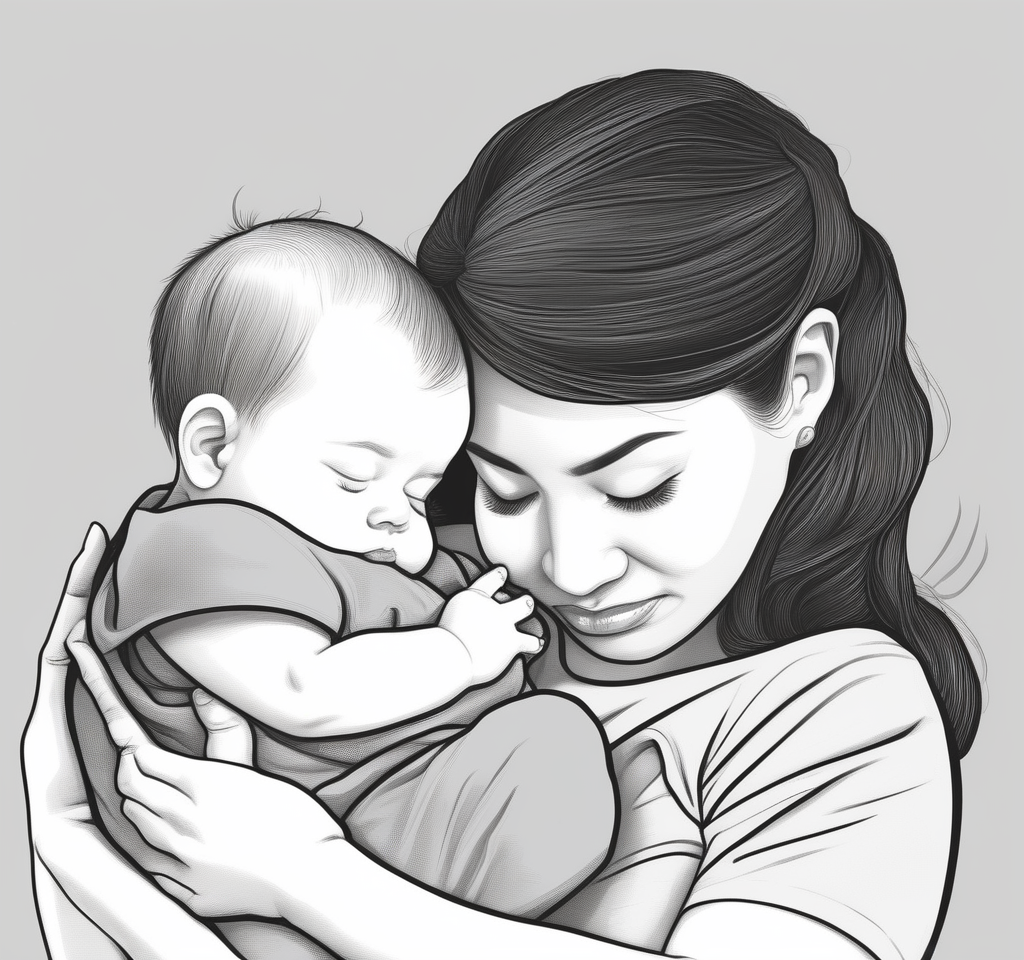Navigating the world of newborn care can often feel like interpreting a puzzle with half the pieces missing. As a new parent, you might find yourself asking countless questions, especially when it comes to your precious baby’s sleep habits. Why does my baby sleep with their mouth open but breathe through their nose? This seemingly odd behavior can cause concern, but it’s a common occurrence that many parents notice. Let me guide you through understanding the whys and how’s of your little one’s sleep quirks, easing your mind so you can both have a peaceful night’s rest.
The sight of your baby sleeping with an open mouth, yet breathing through their nose, can be both adorable and perplexing. By diving into the reasons behind this behavior, you’ll not only gain knowledge but also the power to ensure your baby’s comfort and well-being.
The Science of Mouth Breathing in Newborns
It’s a concern many new parents share: noticing their little ones sleeping with their mouths agape. But why do babies sleep with their mouths open? Often, it’s a natural reflex or due to minor congestion. However, when mouth breathing becomes a habit, it’s crucial to understand the potential health risks.
Mouth breathing in babies can impact long-term baby health, from dental abnormalities to sleep disturbances. It’s essential to address these risks with knowledge and compassion, carefully observing your baby’s breathing patterns.
To safeguard your child’s development, take proactive steps toward prevention.
Why Do Babies Sleep with Their Mouths Open?
Delving deeper into the realm of infant slumber, one might wonder why such tiny beings engage in behaviors that seem counterintuitive to adult norms. Why Do Babies Sleep with Their Mouths Open? This question not only tugs at the heartstrings of parental concern but also opens a window into the intricate workings of baby health.
Babies, with their still-developing nasal passages, might find it easier to breathe through their mouths, especially during sleep when their bodies are in a restful state. This is not a sign of defiance or habit but rather a necessity as their little noses can be easily congested. Mouth breathing, while seemingly harmless, may actually signal that your bundle of joy is struggling to breathe optimally.
Health Risks Associated with Mouth Breathing in Babies
As we delve deeper into the world of newborns, the concern of mouth breathing might seem minor, yet it harbors significant risks that demand our vigilance. Mouth breathing in babies, often unnoticed, can be the silent culprit behind multiple health risks that can affect their growth and development. Prolonged mouth breathing can lead to altered facial development, dental issues such as crooked teeth, and even hinder optimal oxygenation, which is critical for their delicate systems. It’s heartbreaking to consider that such a seemingly benign habit can pave the way for sleep disturbances and reduced sleep quality, potentially impacting their cognitive abilities and overall well-being. As parents and caregivers, it’s imperative to be informed and proactive.
Preventive Measures to Reduce Mouth Breathing in Babies
Shifting our focus to a beacon of hope, let’s explore how we can safeguard our little ones from the pitfalls of mouth breathing. Vigilance is key when it comes to preventing mouth breathing in babies, and it starts with observing your child’s breathing patterns. If you notice your infant frequently sleeping with their mouth open, it may be time to take action.
One effective measure is to ensure that the baby’s sleeping environment is free from allergens, which can obstruct nasal passages and promote mouth breathing. Regularly cleaning the room and using an air purifier can make a world of difference.
Additionally, consider using a humidifier in the baby’s room, as moist air can help keep nasal passages clear.
Understanding the Signs of Dehydration in Newborns
When you notice your newborn’s dry lips, it could be more than just a lack of moisture. Dehydrated lips may signal a need for attention—ensure your little one stays hydrated. Dry lips differ from dehydrated ones; the latter suggests a deeper concern, potentially impacting your newborn’s overall well-being. Act swiftly; dry lips could progress to dehydration. To safeguard your infant, learn to distinguish these signs and implement preventative measures. Keep them well-nourished with regular feedings and a comfortable environment.
Dehydrated Lips in Newborns: Causes and Remedies
Just as newborns can struggle with adapting to breathing, they can also face challenges with maintaining proper hydration. Picture your little one’s smile, a signal of comfort and joy. Now, imagine that same smile with parched, chapped lips—a potential sign of insufficient fluid intake that we must address with gentle care and attention.
Understanding the causes of parchment-like lips in newborns is crucial. It could be as simple as the indoor environment being too arid or a more concerning issue like inadequate feeding. Promptly recognizing these signs allows parents to take swift action, ensuring their infant’s well-being.
Armed with knowledge, parents can confidently employ remedies to combat this.
Dry Lips vs. Dehydrated Lips: Knowing the Difference
While mouth breathing may point to issues of airflow and respiratory health in newborns, another critical sign to monitor is the hydration status of your little one. It’s essential to distinguish between chapped lips, which might simply be a result of external factors such as the weather, and signs of dehydration that require immediate attention.
Chapped lips can often be treated with gentle care and the use of a safe, hydrating ointment. However, if you notice that your newborn’s lips appear persistently parched, this could be a red flag signaling insufficient fluid intake or excessive fluid loss.
How to Prevent Dehydration in Newborns
While mouth breathing can be a concern for newborns, another vital aspect of their wellbeing is ensuring they remain properly hydrated. Preventing dehydration in newborns is not only crucial but also a proactive step towards nurturing a healthy start to life. To keep the threat of dehydration at bay, exclusive breastfeeding for the first six months is highly recommended. Mother’s milk is remarkably sufficient to meet all the hydration needs of your little one, packed with nutrients and antibodies.
For those who are unable to breastfeed or choose not to, using formula that is properly diluted according to pediatrician guidelines is essential. Always heed the advice of your child’s healthcare provider, ensuring that feeding schedules are followed to maintain optimal hydration.
Decoding Baby Sleeping Positions
Understanding the importance of sleep positions for newborns cannot be overstated, as it is crucial for their overall well-being and development. By exploring common sleep positions and decoding what they signify, parents can gain insights into their little one’s comfort and needs. To nurture your infant’s safety and growth, it’s essential to learn how to foster safe and healthy sleep positions. Remember, the way your newborn rests affects not only their restfulness but also their long-term health. Let’s embrace these nurturing practices together, ensuring that every snooze contributes positively to your precious bundle’s journey in life.
The Importance of Sleep Positions for Newborns
As we gently transition from the vital signs of a newborn’s hydration, let’s cradle our attention towards the sanctuary of slumber. Understanding the importance of sleep positions for newborns is as crucial as ensuring they’re well-hydrated. These early stages of life demand more than just instinct; they require our informed vigilance. A newborn’s rest is not just about the duration but also about the safety and comfort of their sleeping posture. Positioning can significantly impact a little one’s breathing, spinal development, and even their ability to achieve a peaceful, uninterrupted rest. By nurturing the proper newborn sleep practices, parents and caregivers can provide a foundation for optimal development and well-being.
Common Sleep Positions and What They Mean
Just as keeping your newborn hydrated is essential, understanding their sleep positions can be equally telling. When it comes to newborn sleep, each pose can be a window into their comfort and well-being.
The classic back-sleep is more than just cute; it’s crucial for safety, reducing the risk of SIDS (Sudden Infant Death Syndrome). Observing your infant snoozing on their back should bring a sigh of relief – they’re in the best position possible!
A baby curled on their side can be a sign of seeking comfort, but remember – it’s a pose that requires vigilance as it can increase the risk of accidental rolling onto the stomach.
And what about the tummy-down tot?
How to Encourage Safe and Healthy Sleep Positions
Just as staying hydrated is key to a newborn’s well-being, so too is fostering secure and beneficial rest positions. How to Encourage Safe and Healthy Sleep Positions is a critical topic that can’t be overlooked.
Ensuring your little one rests securely is a monumental step in safeguarding their overall development. To promote the best rest habits, always place your infant on their back to rest. This position is widely recognized to reduce the risk of Sudden Infant Death Syndrome (SIDS) and supports easier breathing. Keep the crib free of soft toys and bulky bedding which can pose risks. Instead, opt for a fitted sheet and a sleep sack to keep baby warm without the dangers of loose blankets.
Baby Posture: Analyzing Open Mouths and Body Language
Witnessing your baby with an open mouth might seem adorable, but have you considered the nuances behind it? An open mouth in babies can be perfectly normal, yet at times, it signals a need for attention. Let’s untangle this endearing mystery together. The way your little one holds their tiny frame—body posture—plays a pivotal role in their overall well-being. A gentle nudge towards proper positioning could make all the difference. And those ever-changing facial features? They’re a map to understanding your infant’s unique needs. Embrace the subtle shifts as they grow.
Open Mouths in Babies: Is It Normal?
As we gently shift from the tranquility of a baby at rest to the vivacity of their waking hours, a common sight may catch your attention: the open mouth of your little one. When it comes to babies, an open mouth can seem as natural as their endearing coos and giggles. But is it a sign of absolute normalcy? Let’s delve into the significance of this often-overlooked aspect of your baby’s facial features.
An open mouth in babies might strike you as a quaint quirk, but it could also be an early signal worth your attention. It’s commonplace for infants to breathe through their open mouth during intense play or when their tiny noses are congested.
How Body Posture Affects Your Baby’s Health
While deciphering the meaning behind your little one’s slumber style can be intriguing, it’s paramount to consider how their everyday physical stances can greatly influence their overall wellness. A baby’s posture—from the way they lay to the positions they favor during awake periods—can be a subtle yet powerful indicator of their health and development.
When your infant adopts a certain stance, it’s not just adorable; it’s informative. An open mouth, for instance, might seem harmless, but it can sometimes signal respiratory discomfort or the need for a dental check-up if persistent during wakeful hours. Therefore, it’s crucial to gently guide your baby towards preferable stances that promote optimal growth and comfort.
Facial Features and Changes in Newborns
Just as the silent slumber of a babe can tell a story, so too can the delicate visage of a newborn as it transforms. Facial changes in newborns are not just a marvel to behold but are pivotal in understanding their needs and development. Notice the subtle shifts in expression; a newborn’s countenance can signal everything from contentment to the need for nourishment. An open mouth, for instance, might seem adorable, but it can also be a sign of an attempt to breathe more easily or the beginnings of a hunger cue. As a doting caretaker, observing these minute transformations is crucial. Let these signs guide you to respond with loving care, ensuring your little one’s comfort and well-being.
Unusual Baby Sleeping Habits: when to Worry and when Not To
As you navigate the journey of parenthood, understanding your baby’s sleeping habits is key to ensuring they’re developing healthily. What’s Normal? Most infants have varied patterns, but consistency emerges as they grow. However, when you notice irregularities that deviate from typical growth milestones, it’s natural to feel concerned. But remember, not all unusual habits are red flags. When to Worry If your little one exhibits drastic changes in rest patterns or shows signs of distress, it’s time to consult a pediatrician.
Everyday Sleeping Habits of Babies: What’s Normal?
As we gently pivot from the nuances of little ones’ facial expressions and movements, let’s cozy up to the topic of everyday sleeping habits of babies: What’s truly considered normal? It’s essential to understand that infants have their own rhythms and patterns, which can often leave parents wondering if everything is on track. Rest assured, it is perfectly normal for 1cif babies to have a variety of sleep schedules, often waking every few hours to feed—which is crucial for their growth and development.
Encouraging independent sleep should be a gentle process, acknowledging that each child’s journey to sleeping through the night is unique.
When Unusual Baby Sleeping Habits Cause Concern
Shifting gears from the way babies express themselves, let’s tuck into the intriguing world of their slumber patterns. As a parent, you’re likely attuned to the rhythms of your little one’s rest times. But when do those quirks in the night become a nudge to pay closer attention? It’s normal for your sweet pea to have a distinctive resting routine, but some signs may signal it’s time to consult a pediatrician.
If your cherub has difficulty settling down or wakes up more frequently than a star at dawn, don’t brush it off as just another phase. Similarly, if you notice significant changes in their nighttime habits or they seem overly tired during the day, trust your instincts.
Tips to Encourage Independent Sleep in Babies
As we gently transition from understanding the silent cues of our little ones, let’s embrace the journey toward nurturing their slumber routines. Empower your child to rest peacefully on their own with these heartening tips. First and foremost, establish a consistent bedtime routine. This could be a soothing bath, followed by a story, signaling to your child that it’s time to wind down.
Create a sleep-conducive environment with a cool temperature and minimal noise. Consider a white noise machine to drown out disruptive sounds. Swaddling can also provide a sense of security for younger infants, promoting a more undisturbed rest.
Above all, be patient and persistent.
Conclusion
In conclusion, observing your little one’s slumbering habits can be both a source of wonder and concern. It’s essential to remember that infants often exhibit a variety of sleeping behaviors that are perfectly normal. When your child dozes with their mouth ajar but continues to breathe through their nose, it’s usually just a sign of their natural relaxation. However, being attentive to any significant changes or patterns can help ensure your child’s well-being.
By staying informed and vigilant, you can provide the best care for your tiny treasure. If ever in doubt, it’s always wise to consult with a pediatrician. After all, peace of mind comes from knowing you’re doing everything possible to nurture your child’s growth and development. Let’s embrace our role as guardians with both love and knowledge, ensuring our babies flourish in the healthiest environment.
For Related Articles
Dr. Muhammad Nasir is a distinguished scholar in the field of medicinal and organic chemistry. With a PhD under his belt, Dr. Nasir has established himself as an authority in his field, contributing to the scientific community with numerous research publications in reputable journals. His work, which often bridges the gap between organic chemistry and pharmacology, is driven by a deep-seated passion for discovering new therapeutic agents and understanding the intricate dance of molecules within biological systems.
As an Assistant Professor, Dr. Nasir is not only dedicated to advancing research but also to educating the next generation of scientists. He is known for his ability to simplify complex concepts and inspire students through his teaching methods. His commitment to academia is evident in the way he mentors his students, fostering both their academic and professional growth. Dr. Nasir’s contributions to science and education have not gone unnoticed, earning him respect from colleagues and students alike. As he continues his career, he remains at the forefront of his field, shaping the landscape of medicinal chemistry through research, teaching, and a dedication to discovery.













